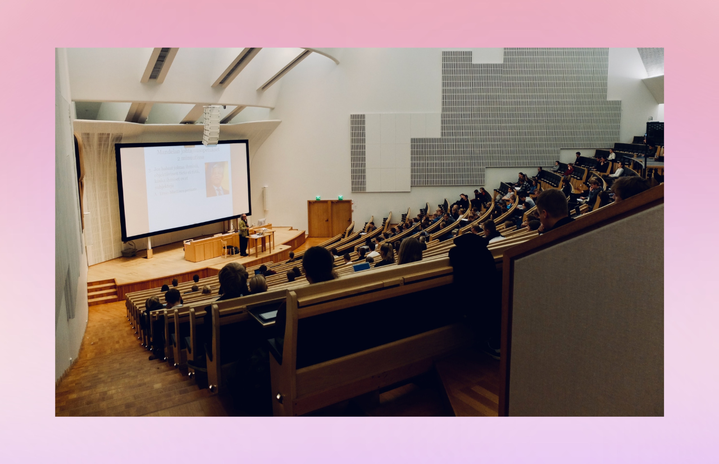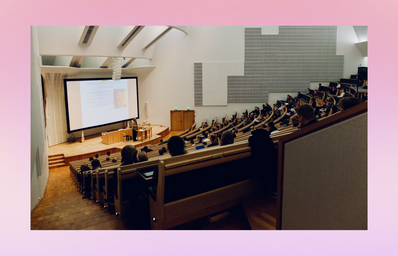Here at the University of Connecticut all first-year students, including transfer students, are required to take a one-credit class to help them learn more about the University and its resources. This class is also a great opportunity for students to connect with their peers and engage with their environment on a deeper level. After taking this class when I transferred to UConn in my sophomore year, I saw how impactful it can be to have a mentor only a year or two older than you are. Talking about my struggles with people who have been in my position before was an invaluable resource for me as I made this transition to UConn, a school more than double the size of where I transferred from. Therefore, I wanted to give back to the community and try my best to be this resource for transfer students as they made the same transition that I did. I am honored to have been a part of the First Year Experience program here at UConn and become a mentor for the Transfer Learning community.
- Everyone experiences college differently
-
College is a period of growth and change for every student and each student deals with this change in different ways. In concert with my mentorship role, through the First Year Experience at UConn, I am required to take an associated Educational Psychology class where I learn how to be a mentor for first-year students at UConn. Although this class is an important resource for me and the other mentors as we take on this invaluable leadership role, it can be difficult to teach someone how to deal with very specific and personal scenarios. Students do not fit into a mold and therefore, there may not be a formula or method on how to help students all the time, in every situation.
Taking the time to understand the unique characteristics of each student during this process is essential in helping the students become the best versions of themselves during their time at UConn. Meeting with my students one-on-one, although it was a requirement for both me and my students, proved to be one of the most rewarding aspects of my mentorship because it allowed me to learn more about not only my students but myself as well. These meetings tested my empathetic listening skills because every student is going through different situations and will deal with these situations in uniquely different ways. It is only after learning about my students that I can then take some of the skills learned in the Education Psychology class and put them to use.
- Public Speaking is not as scary as it seems
-
In high school, I was a very shy student, and I tried to avoid public speaking as much as possible. I dreaded presentations in front of the class. Many people are afraid of what other people may think of them in these situations because they do not want to be wrong or come off as awkward or for many other reasons. Learning to become comfortable speaking in front of crowds is not an easy feat but it was one of the most rewarding skills that I have taken away from this position. Not only has my comfort in the classroom created an emotionally safe environment for my students but it also helped me to become more confident in my own abilities.
The only thing scarier than speaking in public is staying quiet in a situation where your voice is needed.
- You don’t have to have your life figured out
-
Being a mentor to these students, there is a lot of pressure to make it seem as though I know all the answers to their questions. However, the truth is that many times, I don’t know all the answers. I am learning how to balance college life with everything else just as my students are. Being open and honest with my students about what I do know is the first step toward creating a safe space for my students. As I have stated many times, I am learning just as much as my students are during this process. My students have taught me how to become a stronger listener.
Vulnerability with my students about my own struggles will allow them to become more comfortable sharing their struggles in the classroom as well. No one has everything figured out, but sharing sensitive moments helps us find our way.
- not everything is personal
-
One of the major assignments that I had to complete as a mentor was to facilitate a class 100% by myself for an entire 50-minute class period. Although I had been speaking in front of these students for the whole year up until this point, I had never had to facilitate an entire class by myself before. The most I had done in any class before this point was to speak for maybe 20 minutes total. Saying this was a nerve-racking experience is an understatement.
After more than a week of being a nervous wreck, the day of my presentation was finally there. I knew that my students were pretty quiet but I had a plan to hopefully get them to engage with my presentation more thoughtfully. However, as soon as I started my presentation, I could tell that they were going to be hard eggs to crack. Every time I asked a question, I would get 10 blank faces staring back at me. I tried to encourage them with candy and although it got some of them to participate, it did not work as well as I had hoped. By the end of the presentation, I still had about 10 minutes left of class. I felt defeated.
However, after talking to the TA who was overlooking my facilitation, she explained that I did the best I could and that my presentation went really well. She told me not to fault myself for the fact that they didn’t participate. I can’t force them to talk if they don’t want to share. The TA went on to explain how there were probably other factors at play that made them not want to share. I learned that their not participating was not a representation of my abilities and my characteristics. Although it is easier said than done, having this mindset is something that I hope to take with me beyond my academic career at UConn.
- Community is an essential aspect of college
-
Being a mentor has brought me closer to students within the First Year Experience department that I never would have met otherwise. By collaborating with other students in my Educational Psychology class, I learned about how other students are dealing with similar issues in their First Year Experience classes as well. Having a community I can lean on when I am dealing with anything in life is something I never knew I needed.
As someone who grew up very independent, I thought that I could deal with my problems on my own. However, I soon came to realize how important community can actually be. College is a difficult time for many students and there is no reason for anyone to go through their struggles alone. By facilitating a tight-knit community in my classroom with my students, I have learned how important this can be for the growth of my students.
In high school, if you told me that I would be a mentor for a college class and that I would have to speak in front of that class every single week, I would have told you that you were crazy. This experience, although it was originally outside of my comfort zone, was an invaluable experience that changed me for the better. I learned how to be adaptable under stressful circumstances and how to become more confident in my own voice and my abilities. These skills are things that I can take with me for the rest of my life and I will be forever grateful for my experience as a First Year Student Mentor here at the University of Connecticut.


